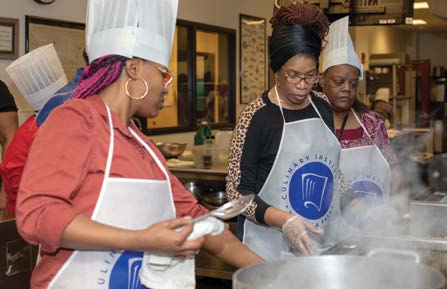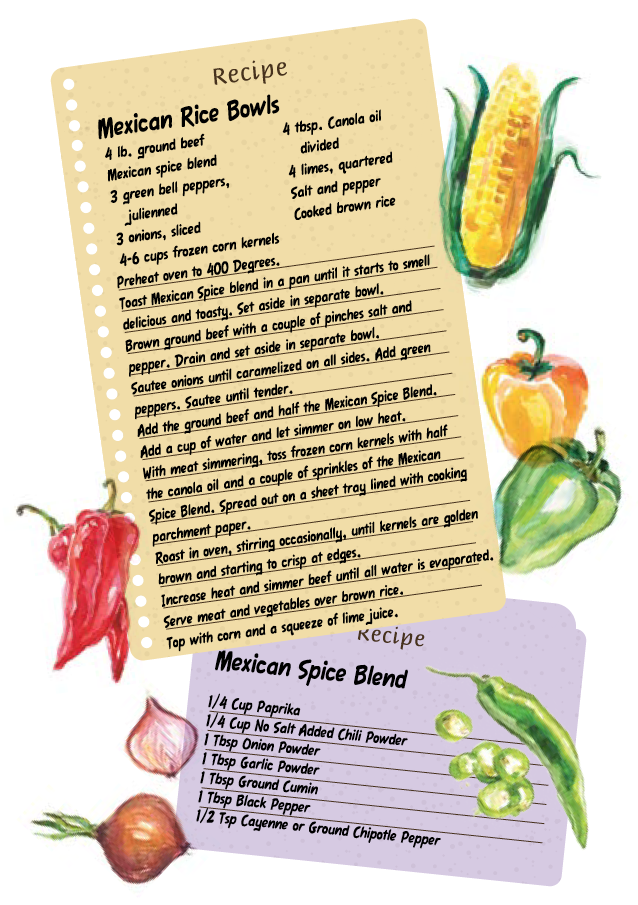Upstate New York Caregivers Stir the Pot
April 16, 2019
Buffalo-area cooking classes promote health and develop professional skills.

But in many communities, it’s easier and cheaper to access processed foods than fresh meat, dairy, fruits and vegetables. These food deserts, with their dearth of healthful foods, are a particularly acute problem in Western New York, even though cities like Buffalo and Niagara Falls are surrounded by much of the New York farmland where fruit and vegetables are grown and harvested.
Healthcare Workers Rising (HCWR), a movement of healthcare workers in Northwestern New York, is addressing the problem while coming together with the support of 1199SEIU, to improve professional standards and communities.
Members of HCWR recently attended a two-day workshop at Niagara County Community College’s new state-of-art hospitality school. Among the goals of the seminar was developing recognition of how closely what we eat is related to how healthy we feel.

“She taught us that more healthy food can still be flavorful. Squeezing lemon on food gives it pop, for example, and baking and boiling is better than frying. I realized the way I was cooking was fattening. I live by myself and I used to use things like chipotle sauce for flavoring, but not anymore. Now I’m trying to eat healthier.”
Wilson also works as a Home Health Aide (HHA) for her sister, who suffered extensive paralysis after having three strokes. Her experience as an agency worker led her into HCWR to connect with other workers and press for better working conditions and standards in the profession.
Ivelisse Ramos lives in Niagara Falls with her daughter and five grandchildren, who are between the ages of one and 13 years old. In addition to helping with her grandchildren, Ramos cares for three adult men with cerebral palsy in a group home run by the Empower agency. She’s using the skills and tips from the cooking class at home and at work.
“I have to cook at home because I have such a large family.
But in the group home they are used to fast food and ready meals heated up in the microwave. After the class, I used the Jerk chicken spice rub we’d learned about, along with sweet potatoes and corn, and they loved it.”
“ I loved it. The seasonings the instructor gave us, I had never tried them before and they were so flavorful. I started buying them for myself at home.“
–Linda Wilson, Elderwood Nursing Home near Buffalo
For her own family, Ramos made the Mexican spice bowl that they had been taught how to prepare in class. She also learned the best techniques for chopping vegetables both quickly and safely with a sharp knife.
In Buffalo, Brianna Kincannon has been working as an HHA for the past six years, looking after four different clients. She previously worked at an assisted living facility as a PCA. Kincannon says most of her clients are elderly and rely on Meals on Wheels. She’s used her new culinary skills to diversify their diets and healthfully spice up the delivered meals.
“One client is Jamaican, and she was so surprised when I made her the Jerk chicken recipe we learned in class,” she said, “We also found out how to make soup from scratch with chicken broth, as well as Greek salad and souvlaki.”
Currently underway is the development of additional modules for the Culinary Continuing Education Training Program.
1199SEIU has been named as one of New York State’s Workforce Investment Organizations and will help implement this program.
1199 Magazine | March / April 2019

